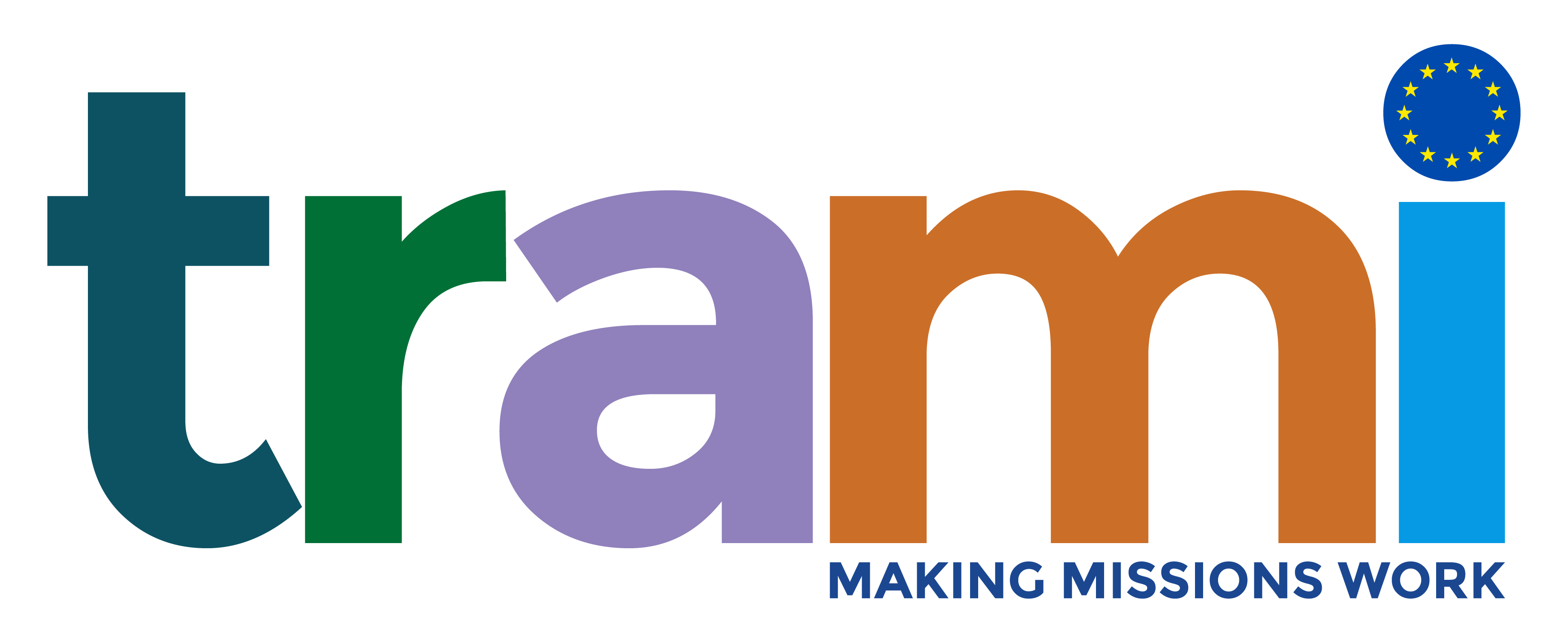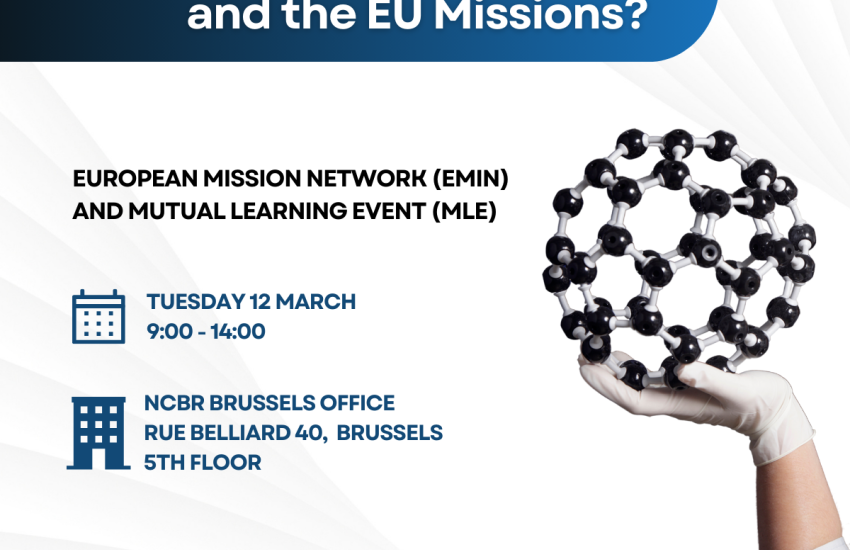Report on the 10th MLE
Role of the European Research in the EU Missions
ORGANISERS: TRAMI (WP3, WP1) and UniLion Network
VENUE: NCBR Brussels Office, Rue Belliard 40, 1040 Brussels, 5th Floor
DATE: 12 March 2024
Introduction
TRAMI together with UnILION held a joint event including 9th European Mission Network (EMIN) and 10th Mutual Learning Event (MLE) with the overarching goal to discuss the role of European research in the EU Missions. While both part focused on the same matter, they approached it from
different angles, by moderated panel discussion in the framework of EMIN and less structured exchange developed in the breakout session (MLE).
Objectives of the event
The objective was to pin down the role of the European research while implementing the EU Mission along with the relevant challenges and benefits for this sector. Furthermore, it was bound to deliberate how to accommodate Research in the missions in the framework of upcoming FP10.
Attendees
The event gathered approx. 51 attendees, this included representatives of regional offices, public authorities, representatives of academic organisation, research entities, private business, university alliances, European associations, along with organisations involved in the implementation
of the Missions or mission projects.
Methodology
An overview of the TRAMI project, EMIN and MLE introduction was provided by Karolina Dutkiewicz-Garcia from National Centre for Research and Development, Wolfgang Polt from Jonneum Research, Angela Schindler-Daniels from DLR and Grainne Ryan from Enterprise Ireland.
Following the overview presentations, professor Jakob Edler from Fraunhofer Institute for System and Innovation Research in his keynote speech set the scene for the following panelists, performing in two panels:
- Sumathi Subramaniam, NORCE (Norway)
- Wolfgang Polt, Joanneum (Austria)
- Thomas Bøgevald Bjørnsten, UAS4EU
- Pirita Lindholm, ERRIN
- Massimo Busuoli, UnILiON
- Jakob Just Madsen, Danish EU Research Liaison Office
- Hilu Kangas-Rant, U!REKA SHIFT Alliance
Following the panel discussions, the participants were divided into 4 breakout groups to address a number of key questions. The participants in the groups were preselected to ensure a maximal balance between all stakeholders. Please find below a combined summary of the outputs of the groups.
Summary of outputs of breakout groups
The participants address a series of questions and below is a summary of their comments.
1. What is the role of the Research and Innovation in the EU Missions ?
-the role of research in the EU Missions is undeniable, or even pivotal – research is inherent to the missions to exist, develops a vision, but being catalyst and motor of changes is not enough to drive process to the final success. EU Missions need research but they should be expanded beyond the
research projects to the other sources of funding in accordance to the project purpose (ESF, ERDF, Life, Erasmus etc.) and translated into policy at the later stage. We need missions but beyond the FP, moreover we need societal change that cannot be solely inspired and driven by research;
- the research part belongs to the FP and could be a catalyst of the deployment; R&I may serve as a tool to mobilize citizens and society or as a facilitator for municipality. Researchers are overloaded, need incentives to include political and social aspects, some training to deliver some policy content (as opposed to the scientific publication which they are accustomed to) and to communicate with the citizens (researchers may not be the experts in communicating their findings). By bringing the research out to the society it boosts its excellence;
- important question: how can we diminish the gap between the scientists and civil servants? There is lack of resources and lack of time to further close the gap. Problem of communication. No structured dialog. Therefore there is a need for a structural change. Possible solution: delegating the competencies towards the NGOs and scientists;
- the cities and climate adaption missions deliver the most of all the missions (according to some participants). Oceans and soil are a challenge at the regional and societal level. Climate adaptions mission is broad but has a clear target, appears the most successful, people recognize themselves in
this mission. Climate adaption is not connected with research. Cities mission is well integrated as already established;
- missions draw more attention to the specified challenges – when Horizon Europe started we did not notice much changes, but the label of the missions gave more attention to the particular challenges;
- the original moonshot mission was clear and had many activities to achieve this, maybe we have too
many missions.
2. What are the benefits for Research to implement the EU Missions Approach?
- missions approach allows to test the results of the research work, providing a practical experience or a test bed (benefit mostly for applied research by bringing it closer to the market);
- mission oriented projects provide an opportunity not only to quantify the impact of research, but also to receive the validation of the research and to have some direct (public) feedback (instead of theoretical models);
- science gets the visibility, good PR, recognition for solving key issues, also understanding the importance of science will be a benefit – however aligning the research with the social needs may be to the detriment of the vision (utility vs. personal interest’ driven research trade-off);
- communicating the results and research areas allows to broaden the discussion – create a “public” image of the research institution and generate cross system dialog with relevant actors or at least help establish communication channel, breaking the silos and accelerating the mission process;
- getting closer to regions, the researchers driven by bottom needs may better understand closing gaps between policy and society;
- mission will open new research areas, as they will see impact – moreover global scale impact is possible;
- a vehicle for research – missions are main instrument in the overarching process of social and economic transformation with the indisputable role of research;
- new constellations (thinking outside the box): the beginnings of the missions implementation were not very promising but universities were interested in the new constellations under Horizon Europe and the missions gave that opportunities also to play a meaningful role;
- joining the mission projects is seen as an opportunity for the newcomers - municipalities and young researchers participating for the first time in the HE.
3. What are the main challenges for Research to implement the EU Missions Approach?
- main and most visible challenges: lack of time, staff, purpose and understanding (by researchers and the public – actually everyone should see their interest here);
- making the mission approach understandable and clear. Appropriate communication – according to the audience. Comms strategies are more focused on the priority not so much on the adequate public;
- general lack of trust in science;
- lack of openness of the research community, that would allow a further involvement of the researchers in the missions; research community tends to be stuck in a project mindset – not being open for changes;
- good governance, accessibility and readability of the mission calls;
- science linked to policy can be an issue, likewise recognition of researchers;
- need to align research for missions’ interdisciplinary aspect and include SSH to keep the Missions sustainable is key;
- the evaluation calls for new indicators in place of the usual ones;
- lack of basic research in HE;
- risk of not having the immediate results;
- the proportion of research and innovation projects in the budget;
- implementation of the research outcomes;
- vague prospects and perspectives of how to accomplish the Missions;
- business contribution is not satisfactory (a missing link between EU Missions and goals defined by businesses);
- dependency of the Missions on the centralized and public funding;
- universities encounter many obstacles in full engagement in the missions if it built upon voluntary basis;
- ministries should act on the local level and put money into the Missions to the local stakeholders to help them fund their engagement;
- limited capacity to discuss the details of the Missions.
- sometimes dispersed ownership of the Mission; considering dedicated DG’s to the Missions is worthwhile;
- global approach to the Missions – not enough external involvement;
- synergies: the Missions do not perfectly fit the other initiatives yet. Maybe fewer missions and fewer partnerships would do, but they need to fit together.
4. What should be role of the research in the EU Missions in the next Framework Programme?
- EU Missions need research (it is critical for the mission) but they should be expanded beyond the research projects and beyond the FP. However, the research part belongs to the FP and could be a catalyst of the deployment;
- leadership of the mission could be considered to be placed somewhere else, beyond DG R&I, with FP10 playing a supportive role;
- ownership of missions needs to be at a very high level and then they can access funding in different DGs not just RTD but RTD being appropriate for research and other DG funding for implementation;
- need of more and diverse funding – more sources of funding to tackle more widely the challenges. We need a clear picture of the funding part, on different levels of TRL and we need a further involvement of private sector;
- in the FP10 missions should be tailored differently, depending on the type of the mission;
- research is an important element but its role can change according to the challenge tackled, so further definition of expectations as for the research community is necessary;
- researchers create new knowledge about implementation and gaps and this should be factored in;
- better incentives for involvement of the researchers;
- FP10 is a reasonable place for missions but need a longer engagement for this initiative; time alignment – Missions’ deadline is 2030 which goes beyond life span of FP10;
- important element for engagement of the research community in the EU Missions – issue of evaluation. Currently the evaluation of their work is lineal and closed, harmonized as its needs to be “comparable”. At the end of the day research is not evaluated due to its impact. There should be more
circular dynamic and new approaches related to measuring the impact and not just “number of publications” released. We need to shift the “theoretical excellence” towards the personalization of impact;
- better communication of the research – mission oriented projects;
- further possibility to attract some global partners, as the challenges are not only European;
- lack of confidence in the missions being present in FP10 due to a lack of ongoing missions’ evaluation;
- concerns about missions being overwhelmed by more urgent needs, like defense (or at least dual use) and its consequences – lack of funding for the missions purposes;
- the missions as fitting numerous regional agendas should be co-created by regions and cities under FP10;
- mission should be anchored in FP10, but need to be more widely connected with different measures like Innovation Fund or ERDF.
- Log in to post comments

